Through Fire
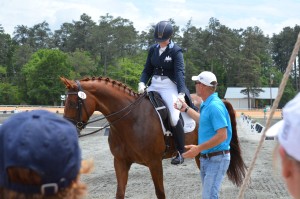 My coach, Michael Barisone, is a Big Deal Guy.
My coach, Michael Barisone, is a Big Deal Guy.
We’d met in passing a few times, but never had more than a superficial “Hi, how are you, nice ride,” conversation until I was at Gladstone a few years ago for one of the USEF Talent Search type things. I had Ella and Midgey, both on the brink of Grand Prix. I was 24 or 25, taking clinics here and there with whoever was around, all good people, but there was no single thread to my training, and I was deeply, terribly lost in the weeds.
I was sitting ringside, licking my wounds after two not-remotely-productive lessons, and Michael approached me. “Hi Lauren. Those are two nice horses you’ve got there,” he said. I thanked him, and he asked, “Do you, you know, have a plan for what you’re doing with them?” Not really, no, I said. “Well, who’s your coach?” he asked. I told him that I clinic with X and Y, and I rode in a lesson with Z last month, and blah blah blah.
And he said something I’ll never forget: “Look, I don’t know you, and you don’t know me. But you’re a talented rider with nice horses, and you need a person. And if you want, I’ll be your person. I’ll show up whenever you need me. I’ll be kind to your amateur ladies, and I won’t try and steal your horses or your clients. And I’ll be your guy.”
No one had ever said that to me before, and he’s made good on every promise. I’m writing this from the Regional Finals, where I had a tough school on Ella on Thursday morning, and texted Michael that everything was horrible and I was quitting, and he texted me back right away that it was all going to be fine, then gave me 24 hours to shake it off before calling me up to tell me that everything is going to be fine, to give me a few things to think about in my next schooling ride, to tell me it was OK that I have these little freakouts (I’m very consistent), and that he loved me.
He’s my guy.
Read the rest at The Chronicle of the Horse!
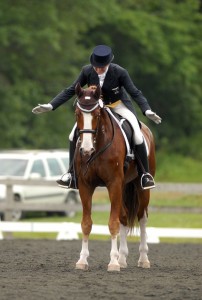 Meet him at late 3 or early 4 years old. He’s keen-eyed and clever-looking, and he walks, trots and canters under saddle. He goes when you drive and whoas when you gather and mostly steers. He stands on the crossties and gets on the trailer and stands at the mounting block. He’s balanced and shiny and remarkably organized, with nice conformation and clean legs. You love him immediately, which is good, because two weeks later he’ll have kicked the stall and sliced his leg open, and grown an inch behind, and lost the capacity to turn right. Love him anyway.
Meet him at late 3 or early 4 years old. He’s keen-eyed and clever-looking, and he walks, trots and canters under saddle. He goes when you drive and whoas when you gather and mostly steers. He stands on the crossties and gets on the trailer and stands at the mounting block. He’s balanced and shiny and remarkably organized, with nice conformation and clean legs. You love him immediately, which is good, because two weeks later he’ll have kicked the stall and sliced his leg open, and grown an inch behind, and lost the capacity to turn right. Love him anyway.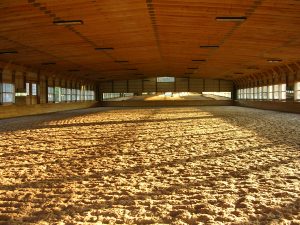 A collection of any of the number of things that get said while riding at my farm on any given day:
A collection of any of the number of things that get said while riding at my farm on any given day: How we all come to find our trainers is a personal journey. Some folks get it right right off the bat, but more often than not, we’ve all kissed a few frogs along the way to finding our educational Prince (or Princess!) Charming, and we’ve also inevitably outgrown perfectly good programs and needed to seek out something, someone else.
How we all come to find our trainers is a personal journey. Some folks get it right right off the bat, but more often than not, we’ve all kissed a few frogs along the way to finding our educational Prince (or Princess!) Charming, and we’ve also inevitably outgrown perfectly good programs and needed to seek out something, someone else.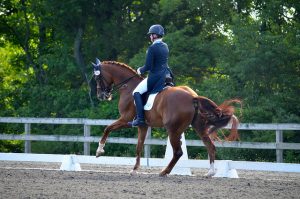 I judged a few schooling shows at the Quantico Marine Base stables when I first arrived in Virginia. While there I chatted with a few of the faithful Marine husbands, at the show to support their wives. I forget how we got on the subject, but one told me that there’s a saying that goes around Marine basic training: “Embrace the suck.” It’s boot camp, preparing you for life as an elite warrior—it’s going to suck. And the sooner you accept that it’s going to suck, the easier things get.
I judged a few schooling shows at the Quantico Marine Base stables when I first arrived in Virginia. While there I chatted with a few of the faithful Marine husbands, at the show to support their wives. I forget how we got on the subject, but one told me that there’s a saying that goes around Marine basic training: “Embrace the suck.” It’s boot camp, preparing you for life as an elite warrior—it’s going to suck. And the sooner you accept that it’s going to suck, the easier things get.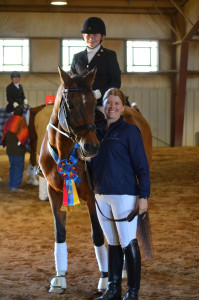 1. Above all else, know this: we want you to be successful. We want this for you because that’s our job, of course—to produce successful students, at whatever “success” means to you. Whether winning the Olympics or just cantering two circles around without being afraid, we want you to Win at It. And if you doubt that we want you to win simply because its in our natures, consider this: happy clients are more likely to keep paying us, and more likely to tell others they should pay us. Happy clients = good business.
1. Above all else, know this: we want you to be successful. We want this for you because that’s our job, of course—to produce successful students, at whatever “success” means to you. Whether winning the Olympics or just cantering two circles around without being afraid, we want you to Win at It. And if you doubt that we want you to win simply because its in our natures, consider this: happy clients are more likely to keep paying us, and more likely to tell others they should pay us. Happy clients = good business.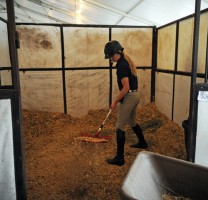 I had an open working student job all summer, and then added another position that I needed to fill this fall. (Both filled, amen!) It meant that it was a summer of resumes and interviews, and of getting down to a science my hiring procures. And it is thus: someone emails me asking for more information about the job, and I write back with a description of a typical day, as well as with what other chores I expect my staff to do. And I also tell them what I offer for compensation.
I had an open working student job all summer, and then added another position that I needed to fill this fall. (Both filled, amen!) It meant that it was a summer of resumes and interviews, and of getting down to a science my hiring procures. And it is thus: someone emails me asking for more information about the job, and I write back with a description of a typical day, as well as with what other chores I expect my staff to do. And I also tell them what I offer for compensation.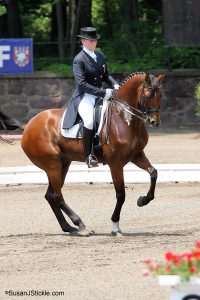 “You know,” my mother said, “I’m just starting to appreciate what hard work dressage is.”
“You know,” my mother said, “I’m just starting to appreciate what hard work dressage is.”